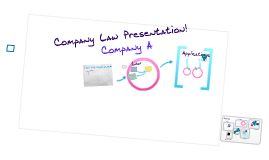Company Law
Transcript: If in any act or contract of a company, its name is not fully or properly indicated as required under Sec 147 of the Company’s Act, every person who is involved in the doing of the act or making of the contract shall be personally liable for it. Thus, in Hendon vs. Adelman 1973 New Delhi LR 637, the directors were held personally liable on a cheque signed by them in the name of the company stating the company’s name as 'L.R. Agencies Ltd.’ the real name being 'L. & R. Agencies Ltd’. Meaning In case of misrepresentation in a prospectus, every director, promoter, and all persons concerned incur liability under section 62 of the Company's Act. Under section 63, the liability can be a fine up to rupees 50,000 or imprisonment up to 2 years or more. Thank You Misdescription of Company Name By the Judiciary By the Legislature As stated stated earlier this entire doctrine of 'lifting of corporate veil', though of paramount importance, does not owe its existence to legislative draftsmanship, is a prime example of judicial ingenuity. Time and again, the courts have gone behind the facade of corporate identity in their search for truth, though again, many are the instances when the courts have refused to look behind this veil of legal personality. Thus, whether the court would be willing to pierce the corporate veil or not, would rather depend on the gravity and need of the particular situation, but for the following purposes the courts have been very willing to lift the veil. Fraud or improper conduct Where a Holding company holds 100% shares in a subsidiary company and the latter is created only for the purpose of the holding company, the corporate veil can be lifted. This principle was held in the case of U.P vs. Renusagar Power Co.[1991J 70 Comp Cas.127 and Merchandise Transport Limited vs. British Transport Commission.[1982J 2 QB 173]. by Pariket Shah Under section 45 of the Company's Act, if a company carries a business for more than six months with less than two members, any person who is a member after the lapse of the six month period may become liable, jointly and severally with the company for the payment of it's debts. This section does not operate to destroy the separate personality of the company. It still remains an existing entity even though there may be only one member or more. A creditor's rights under the section are severely limited. It is only a member who remains after the end of 6 months who can be sued, and then also only if he knows that the company is carrying on business with only member, and he is further liable for only those debts contracted after the 6 month period and while he was still a member. A director does not become automatically liable unless he is a member also. Due to these limitations the rule is more of theoretical interest rather than of practical importance. Lifting of CORPORATE VEIL The circumstances under which the courts may lift the corporate veil are put under two heads: Holding subsidiary company As per section 69 of Company's Act and SEBI regulations 2009. In case of company failing to receive minimum subscription within 120 days after the date of first issue of prospectus, it must refund the entire application money within the next 10 days failing which it shall refund the same with interest at 6% per annum. Circumstances when the Lifting of It may in certain situations become necessary for the courts to determine the character of a company to check if it is an enemy". In such cases, it goes behind the legal identity, to examine the character of the persons actually in control of it. One of the leading cases on this point is Daimler Co. lid v. Continental Tyre & Rubber Co. [(1916) 2 AC 307: (1916-17) All ER 191J. Here, a company was incorporated in England for the purpose of selling tyres manufactured in Germany by a German Company. The German Company held the bulk of the shares in the English company. The holders of the remaining shares (save one) and all the directors were Germans, residing in Germany. Thus the real control of the English company was in German hands. During the First World War, the English company commenced an action to recover a trade debt and the question was whether the company had become an enemy company and should, therefore, be barred from maintaining the action. House of Lords held that, "a company incorporated in the UK is a legal entity, a creation of law with the status and capacity which the law confers. It is not a natural person with mind or conscience. It can be neither loyal nor disloyal. It can be neither a friend nor enemy. But it may assume an enemy character when persons in defacto control of its affairs, are residents in an enemy country or, wherever resident, are acting under the control of enemies". Accordingly the company was not allowed to proceed with the action. But where no such monumental questions of public policy or national importance are involved, the courts refuse to look behind the corporate entity to ascertain

















